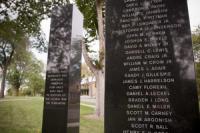-
Transnational Organized Crime and National Security: Hezbollah, Hackers and Corruption
American law enforcement efforts have become increasingly multifaceted as the government attempts to combat the continuing ingenuity and sophistication of transnational organized criminal groups. Eric Halliday writes in Lawfare that the U.S. government has announced several significant actions taken against transnational organized crime groups. The Treasury Department’s Office of Foreign Assets Control (OFAC) promulgated a slew of sanctions against the financial networks of both Hezbollah and Cártel de Jalisco Nueva Generación (CJNG). The Justice Department announced takedowns of drug trafficking rings spanning the U.S. and Mexico as well as a large-scale organized cybercrime ring composed of members from several Eastern European countries.
-
-
Why Terrorists Sometimes Apologize for Their Actions

Armed groups often rely on violence and instilling fear to show strength and resilience. And yet, every so often, they are willing to apologize when things go wrong. The New IRA recently apologized for killing Lyra McKee, an investigative journalist, during a riot in Derry. The group’s targets, which they described as “enemy forces,” were officers of the Police Service of Northern Ireland. As scholars of conflict, we both study a variety of armed groups, from nationalist and separatist liberation movements to Islamist opposition groups. Ioana Emy Matesan and Ronit Berger write in the National Interest that over time, comparing anecdotes turned into a systematic investigation of armed attacks, in order to address an understudied question: Do rebel groups ever apologize for their mistakes? If such groups were ever willing to apologize for their actions, we wanted to understand when and why they would do so. We hoped it would help us find ways to negotiate resolutions during conflicts.
-
-
Populist Eurosceptic parties do not gain support in response to terrorist attacks
New research has found that terrorist attacks in Europe don’t increase support for populist parties. In fact, people in Germany became more positive towards the EU after the 2016 Berlin Christmas market attack in that country, the researchers found.
-
-
Germany Has a Neo-Nazi Terrorism Epidemic
Tanjev Schultz, a professor of journalism at the Johannes Gutenberg University in Mainz and the author of a prizewinning book about right-wing terrorism in Germany, says that in Germany’s public imagination terrorism tends to be associated with the left. Memories of the Red Army Faction and the series of political assassinations it undertook are still in the foreground of many Germans’ minds. Meanwhile, neofascistic terrorist attacks like the bombing of a Munich beer garden in 1980 have been largely forgotten. Peter Kuras writes in Foreign Policy that Schultz told him that this blindness to right-wing terrorism is one of the reasons that it took authorities so long to recognize that the 10 murders carried out by the National Socialist Underground (NSU) beginning in 2000 were the work of a terrorist organization. Indeed, as Jacob Kushner has documented in Foreign Policy, authorities largely tried to restrict the investigation into the group’s three core members, Uwe Mundlos, Uwe Böhnhardt, and Beate Zschäpe, despite the fact that there was strong evidence that they had substantial support from other right-wing extremists, as well as some indication that some of that support may have come from within the government.
-
-
Al-Qaeda Is Stronger Today than It Was on 9/11
Despite a United States-led global “war on terror” that has cost $5.9 trillion, killed an estimated 480,000 to 507,000 people and assassinated bin Laden, al-Qaeda has grown and spread since 9/11, expanding from rural Afghanistan into North Africa, East Africa, the Sahel, the Gulf States, the Middle East and Central Asia. In those places, al-Qaeda has developed new political influence – in some areas even supplanting the local government.
-
-
White Supremacists Increase College Campus Recruiting Efforts for Third Straight Year
White supremacist propaganda distribution on college campuses increased for the third straight year, according to data released today by ADL. 2019 spring semester saw more extremist propaganda on campus than any preceding semester, with 161 incidents on 122 different campuses across 33 states and the District of Columbia.
-
-
Re-thinking Biological Arms Control for the 21st Century
International treaties prohibit the development and use of biological weapons. Yet concerns about these weapons have endured and are now escalating. Filippa Lentzos writes in a paper issued by the U.S. Marine Corps that a major source of the growing concern about future bioweapons threats stem from scientific and technical advances. Innovations in biotechnology are expanding the toolbox to modify genes and organisms at a staggering pace, making it easier to produce increasingly dangerous pathogens. Disease-causing organisms can now be modified to increase their virulence, expand their host range, increase their transmissibility, or enhance their resistance to therapeutic interventions. Scientific advances are also making it theoretically possible to create entirely novel biological weapons, by synthetically creating known or extinct pathogens or entirely new pathogens. Scientists could potentially enlarge the target of bioweapons from the immune system to the nervous system, genome, or microbiome, or they could weaponize ‘gene drives’ that would rapidly and cheaply spread harmful genes through animal and plant populations.
-
-
A Global War on Terror Memorial Is Unnecessary

Chris Yeazel writes in War on the Rocks: “I am a veteran of the “Global War on Terror,” and believe that constructing a memorial to the war I fought in is unnecessary. The effort is well-intentioned and sincere, but risks creating a sense of false closure for the American people regarding a series of conflicts that remain far from over. Perhaps more importantly, veterans could have a positive impact on the lives of many Americans if we redirected the energy dedicated to constructing such a memorial towards other causes.”
-
-
U.S. faces long-standing biological threats challenges
GAO officials testified before a House committee on their efforts to identify and strengthen U.S. biodefense. GAO has also released a report highlighting the agency’s findings. Despite President Trump signing off on the Pandemic and All-Hazards Preparedness and Advancing Innovations Act (PAHPA) on Monday, GAO says that there is still a lot of work to be done.
-
-
Israeli cyber intel helped foil attacks in “dozens” of countries
Israeli cyber intelligence has helped thwart “major” terrorist attacks in “dozens” of countries, Israeli Prime Minister Benjamin Netanyahu said at a cyber-security conference in Tel Aviv on Wednesday. Israel shares information about cyber-threats and attacks with 85 countries, he explained.
-
-
Small increase in far-right extremist violence in Germany
The BfV, Germany’s domestic intelligence service, said that violent crimes driven by xenophobia rose slightly in Germany last year. In a new report, BfV says that there were 24,100 right-wing extremists in Germany — 100 more than in 2017 — of whom 12,700 were considered “violence-oriented.”
-
-
Tehran has set up network of terror cells in Africa to attack U.S., Western targets
As part of its broad response to the increasing severity of the Western economic sanctions, Iran has been setting up a sprawling network of terror cells throughout Africa. The cells, operated by the Quds Force, the branch of Iran’s Revolutionary Guard Corps which is responsible for overseas operations, aim to attack U.S. and other Western targets, at the time and place of Tehran’s choosing, in retaliation for the sanctions – let alone a military strike by the United States or Israel.
-
-
Hezbollah operative collected sensitive information about Toronto Airport for potential future attack
An operative for the Iranian-backed terrorist organization Hezbollah collected “detailed information” about Toronto’s Pearson airport, according to a report released by Canada’s air safety agency on Tuesday. The Hezbollah operative also scouted New York’s JFK airport and U.S government facilities, as well as identifying Israelis in the United States who could be targeted by the Iranian-sponsored terrorist group.
-
-
International community unprepared to deal with catastrophic biological event
The risks of a global catastrophic biological event are growing, intensified by an increasingly interconnected world, terrorist and state interest in weapons of mass destruction, global political instability, and rapid advances in biotechnology. International leaders and organizations today are unprepared to react with the kind of effective, coordinated response needed to investigate and identify the pathogen, prevent the spread of disease, and, most importantly, save lives.
-
-
How the "White Replacement" conspiracy theory spread around the globe
From pockets in small town Minnesota to Christchurch, New Zealand, a racist conspiracy theory has taken hold—sometimes to deadly consequences. The “great replacement,” also known as “white genocide,” is summed up by its name: a secretive cabal of elites, often Jewish, is trying to deliberately destroy the white race through demographic change in importing immigrants and refugees. Luke Darby writes in GQ that obsession with racial purity obviously goes far back, but the modern iteration of “white genocide” comes almost directly from The Turner Diaries, a racist novel self-published in 1978 by neo-Nazi William Luther Pierce, writing under the pen name Andrew Macdonald. The book is set in a dystopian America where white people have been disarmed and oppressed by non-whites. The book culminates in a white nationalist revolution led by a group called The Order, who go on to plan a global genocide against non-white people. There’s another layer to the panic over demographics: the fear that birth rates for white people are falling all across western nations. The idea was partially popularized in a 2012 book by French philosopher Renaud Camus, and it’s articulated in another white nationalist trope, the “14 Words”: “We must secure the existence of our people and a future for white children.”
-
More headlines
The long view
Patriots’ Day: How Far-Right Groups Hijack History and Patriotic Symbols to Advance Their Cause, According to an Expert on Extremism
Extremist groups have attempted to change the meaning of freedom and liberty embedded in Patriots’ Day — a commemoration of the battles of Lexington and Concord – to serve their far-right rhetoric, recruitment, and radicalization. Understanding how patriotic symbols can be exploited offers important insights into how historical narratives may be manipulated, potentially leading to harmful consequences in American society.
Luigi Mangione and the Making of a ‘Terrorist’
Discretion is crucial to the American tradition of criminal law, Jacob Ware and Ania Zolyniak write, noting that “lawmakers enact broader statutes to empower prosecutors to pursue justice while entrusting that they will stay within the confines of their authority and screen out the inevitable “absurd” cases that may arise.” Discretion is also vital to maintaining the legitimacy of the legal system. In the prosecution’s case against Luigi Mangione, they charge, “That discretion was abused.”
“Tulsi Gabbard as US Intelligence Chief Would Undermine Efforts Against the Spread of Chemical and Biological Weapons”: Expert
The Senate, along party lines, last week confirmed Tulsi Gabbard as Director of National intelligence. One expert on biological and chemical weapons says that Gabbard’s “longstanding history of parroting Russian propaganda talking points, unfounded claims about Syria’s use of chemical weapons, and conspiracy theories all in efforts to undermine the quality of the community she now leads” make her confirmation a “national security malpractice.”
